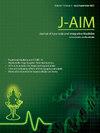IFTAK technique for management of anterior fistulae in ano in female patients - A case series
IF 1.9
Q3 INTEGRATIVE & COMPLEMENTARY MEDICINE
引用次数: 0
Abstract
Anterior fistula in ano is an uncommon and challenging condition in females, with sparse literature describing effective management strategies. Surgical interventions are often complicated by the anatomical intricacies of the pelvic region. This case series explores the use of the Interception of Fistulous Tract with the Application of Ksharasutra (IFTAK) technique, a modification of traditional Ksharasutra therapy, in managing anterior fistulae in ano among female patients. Three female patients with anterior anal fistulae, two with failed prior surgical interventions, were included. Comprehensive preoperative evaluations, including clinical and radiological assessments, were performed. The IFTAK technique was employed, emphasizing tract interception and eradication of sepsis without compromising the anal sphincter. All patients achieved complete healing within 8 weeks post-procedure. No recurrence, incontinence, or significant complications were observed during a 12-month follow-up. The IFTAK technique is a promising approach for anterior fistulae in ano in females, offering high success rates with minimal complications. While the results are encouraging, validation through well-designed randomized controlled trials is essential for its broader adoption as a standard treatment for complex anal fistulas.
IFTAK技术在治疗女性患者肛门前瘘中的应用-一个病例系列
肛门前瘘在女性中是一种罕见且具有挑战性的疾病,文献很少描述有效的管理策略。手术干预往往是复杂的解剖盆腔区域。本病例系列探讨了在女性患者中应用Ksharasutra (IFTAK)技术(一种对传统Ksharasutra疗法的改进)阻断瘘道治疗前瘘的应用。本研究包括三名女性前肛瘘患者,其中两名先前手术干预失败。进行全面的术前评估,包括临床和放射学评估。采用IFTAK技术,强调在不损害肛门括约肌的情况下阻断和根除脓毒症。所有患者均在术后8周内完全愈合。随访12个月,无复发、尿失禁或显著并发症。IFTAK技术是治疗女性肛门前瘘的一种很有前途的方法,成功率高,并发症少。虽然结果令人鼓舞,但通过精心设计的随机对照试验进行验证对于将其广泛采用为复杂肛瘘的标准治疗至关重要。
本文章由计算机程序翻译,如有差异,请以英文原文为准。
求助全文
约1分钟内获得全文
求助全文
来源期刊

Journal of Ayurveda and Integrative Medicine
INTEGRATIVE & COMPLEMENTARY MEDICINE-
CiteScore
4.70
自引率
12.50%
发文量
136
审稿时长
30 weeks
 求助内容:
求助内容: 应助结果提醒方式:
应助结果提醒方式:


